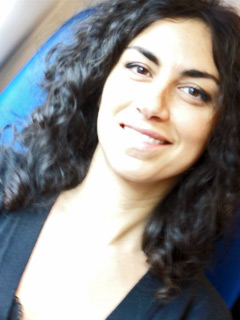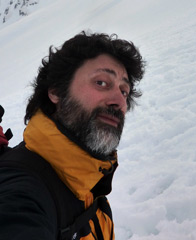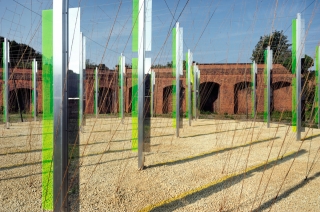The artistic production of the common between territorialization and (re)localisation
The module focuses on the research about spatial and symbolic production of the common in art and place-making practices, meant as a tool for territorialization processes and (re)localisation of artistic practices within socio-cultural contexts.
Cultural denomination of spaces and places could affect our relationship with society, space, as well as with environment and time. It could encourage forms of spatial regeneration and self-alteration of societies (future); the experimentation of new spatialities framed both in the sustainability of territory meant as common good and/or the monadic immaterial and material public spaces, as spatial configuration of the global logic (present); but also the production of new forms of spatial and social control responding to modern cartographic strategies (past).
By interacting with geographical disciplines such as cultural geography and geophilosophy, the module explores the forms and the images of the common sense, as origin of the ways in which societies institute their imaginary meanings, “what remains unchanged when a message is a code that is translated into another” (Cornelius Castoriadis, 1975), that could lead to new forms of local and global objectivities. This meaning seems to be subverted by Michelangelo Pistoletto, who theorized the omnitheism as the “artistic and spiritual philosophy that divides the concept of god in the singularity of each person”, by placing the common between secularity and transcendence.
The module includes periods of research and production, with the aim at tracing non-predefined territorial and extraterritorial relations through concepts, forms and images of the common that eventually would compose a spatial configuration of the (re)localization process of the participants’ own artistic practices.
The mentor may request the participants to send documentation regarding their research interests related to the main issues of the seminar.
SCHEDULE
June 29th
morning
Guided tour to Cittadellarte, including the Pistoletto, Arte Povera collections and temporary exhibitions (curated by Luca Furlan)
Group presentation
Presentation of the program, objectives and the tools for investigation and production at disposal of the participants, within Cittadellarte and outside
Introduction of participants, their statement and their interest about the workshop’s issues. The participants are required to share their own definition of common accompanied by iconographical, textual or any other kind of documentation that relates it to strategies of potential processes of (re)localisation of art practice in the social – environmental space from the place of provenance
afternoon
“Collective Dictionary / the Common”: On Line Meeting with Campus in Camps, Palestine. Following screening video and discussion
June 30th
morning
Between art and geography: presentation of the work and research of geographer Thomas Gilardi, who will introduce methods and issues on which is based the investigation and the production of knowledge of the place by the new cultural geography;
Between art and geography: investigation, research and collection of territorial datas, visual and/or non visual, conceptual and/or figurative, inside and/or outside Cittadellarte, considered symptomatic, narrative or representative of the common
afternoon
“Self-ethnographic Constellation”, the self-colonization of the social imaginary: On Line Meeting with Thiago Florencio (Rio de Janeiro, Brazil), PhD in Literature and Contemporary Culture, specialized in Afro-Brazilian History. Following screening video and discussion
July 1st
morning
Between art and geography: investigation, research and collection of territorial datas, visual and/or non visual, conceptual and/or figurative, inside and/or outside Cittadellarte, considered symptomatic, narrative or representative of the common. Individual and collective discussions about the outcomes of the investigation and the spatial configuration of territorial and extraterritorial relations
afternoon
The regeneration of the place between past and future: On Line Meeting with UK artist Jyll Bradley about Green/Light (For M.R.), public art installation commissioned by the Folkestone Triennial 2014 curated by Lewis Biggs. Following screening of a selection of audio-video works and discussion
July 2nd
morning
Between secularity and transcendence, the production of new rural archetype as new spatiality of the common: On Line Meeting with Gaetano Carboni, PhD in Law specialized on common goods and founder of the project Pollinaria, Abruzzo, Italy. Following screening video and discussion
afternoon
Collective sharing of outcomes of individual researches and discussion about the final collective spatial configurations of the (re)localisation process of Unidee participants’ artistic practices
July 3rd
daytime
Composition of the spatial configurations of art practices’ (re)localisation process on individual or collective display. Public presentation of the module’s outcomes and collective evaluation of the program
evening
Party
REFERENCES
The mentor will prepare a reader for participants with key texts, some of which will be discusses during the week.
CASTORIADIS Cornelius, The imaginary institution of society [L’institution imaginaire de la société, Paris: Éditions du Seuil, 1975], translated by Kathleen Blamey, Cambridge, The MIT Press, 1998.
Available at the link: http://base.mayfirst.org/wp-content/uploads/2013/03/cornelius-castoriadis-the-imaginary-institution.pdf
DELEUZE Gilles, GUATTARI Félix, «Geophilosophy», What is philosophy?, Paris, Les Éditions de Minuit, 1991.
Available at the link: http://nfk.be/CUDI/levinas-2009-2010/deleuze-3207-what_is_philosophy.pdf%20%28fenomenologie%20van%20schilderkunst%29.pdf
HARTOG François, Time and Heritage, Oxford and Malden (USA), Blackwell Publishing, data.
Available at the link: http://collectivememory.fsv.cuni.cz/CVKP-52-version1-Hartog.pdf
HOLMES Brian, Continental Drift project, texts and images available on: https://brianholmes.wordpress.com/
MAGNAGHI Alberto and the Territorialists’ Society, Manifesto, translated by Marie-Anne Gillis, 2011.
Available at the link: http://www.societadeiterritorialisti.it/images/DOCUMENTI/manifesto/110221b_draft.of.the.territorialists.society.manifesto.pdf
MARKUSEN Ann, GADWA Anne, Creative Placemaking, Washington DC : Markusen Economic Research Services and Metris Arts Consulting, 2010.
Available at the link: http://arts.gov/file/1919
PISTOLETTO Michelangelo, Omnitheism and Democracy, Biella, Cittadellarte, 2012.
Available at the link: http://www.cittadellarte.it/attivita.php?att=70
SUBIRATS Joan, «The commons: beyond the market vs. state dilemma», Open Democracy, 12 July 2012.
Available at the link: https://www.opendemocracy.net/joan-subirats/commons-beyond-market-vs-state-dilemma
TURCO Angelo, «Mythe et Géographie», Cahiers de géographie du Québec, vol. 45, n° 126, 2001, p. 369-388.
Available at the link: http://www.erudit.org/revue/cgq/2001/v45/n126/022999ar.pdf
Vv.Aa., Cartes et Figures de la Terre, Paris, Centre Georges Pompidou, 1980. Catalogue of the namesake exhibition that took place at Centre Georges Pompidou, Paris, from 24 mai 1980 to 17 novembre 1980, curated by Cci, J. Mullender, G. Macchi.
Info: https://www.centrepompidou.fr/cpv/resource/ciBqEe/r9nkggq
Vv.Aa, «Regimes of Temporality», Investigating the Plurality and Order of Times across Histories, Cultures, Technologies, Materialities and Media, Oslo, UiO Kultrans - University of Oslo, 2013. Published on the occasion of the International Conference which took place at the University of Oslo from 5 to 7 June 2013.
Available at the link: http://www.uio.no/forskning/tverrfak/kultrans/aktuelt/konferanser/regimesoftemporality/program/abstracts-regimes-final-5-internet.pdf
websites:
Campus in Camp / Collective Dictionary: www.campusincamps.ps
Jyll Bradley, works and texts: http://jyllbradley.com/writing/
Pollinaria project: www.pollinaria.org
Future Farmers, “Consortium Instabile”, 2014: http://www.futurefarmers.com/consortiuminstabile/

BIOGRAPHY AND STATEMENT
Giusy Checola (San Severo, 1973) is scholar and curator of artistic-interdisciplinary projects often focused on the relationship between art and public sphere and developed in relation with geography and geophilosophy. Her current research is devoted to place-making, to the creation of cultural conditions encouraging processes of generation and regeneration in the public spaces and/on common places, and to the effects produced by public art. Founder of the platform and archive Archiviazioni (Southern Italy), she is part of the curatorial board of SoutHeritage Foundation of Matera (Italy), researcher for IPA (Institute for Public Art, US and China) and PhD candidate at University Paris VIII Vincennes Saint-Denis (France).

GUEST
Thomas Gilardi (Milan, 1973) graduated in Geography at University of Genoa. His studies have focused on the terraced landscape and the urban one. Since 2003, alongside the research, he is consultant for public and private institutions for the production of laboratories of geography, which pay particular attention to environmental and intercultural issues. He is PhD candidate at University of Milan and teaches geography in secondary schools.
download the full documentation about the module and the mentor in PDF format
